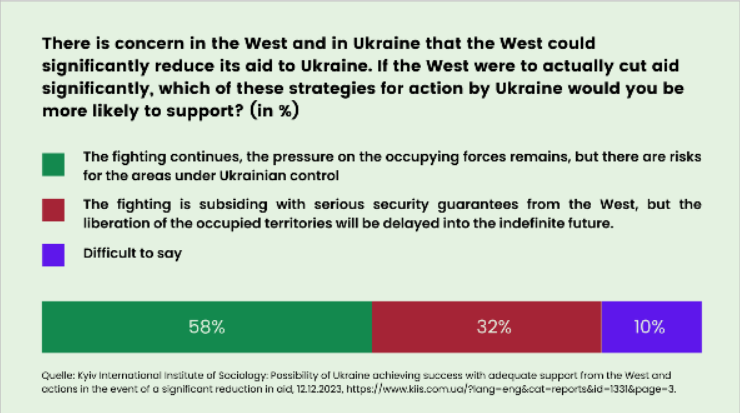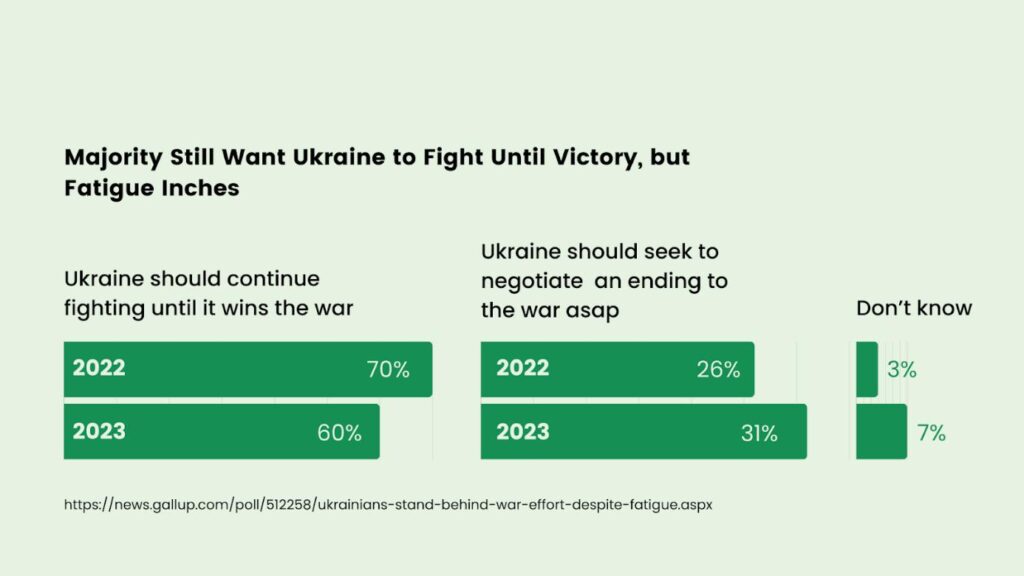Amira Mohamed Ali, a German politician of the new left-conservative party ‘Bündnis Sahra Wagenknecht’, claimed “The Ukrainian leadership says that it wants to continue fighting, but the many thousands of deserters who are trying to leave Ukraine say something different.” This statement turned out to be uncheckable.
Amira Mohamed Ali has been a member of the German Bundestag (federal parliament) since 2017, representing Lower Saxony. Since 2023 she is part of the new party “Bündnis Sahra Wagenknecht”. The Bündnis Sahra Wagenknecht (Sahra Wagenknecht Alliance) is a political movement that combines both the left and right wing views in Germany, named after Sahra Wagenknecht, a prominent figure within the party. Wagenknecht, a former co-chair of the parliamentary group “Die Linke” (the left) in the Bundestag, is known for her strong and controversial stances on economic and social justice issues. The new left-conservative alliance, often referred to simply as “Bündnis,” supports her political positions and has worked to advance her agenda.

The following statement was made during the German public service TV broadcast “ZDF Morgenmagazin” on 3rd April 2024. On the 75th anniversary of NATO, the host Andreas Wunn interviewed Amira Mohamed Ali regarding the party’s views on defence and armament. Mohamed Ali called for immediate ceasefire and peace negotiations. She stated that an ongoing war was neither in Russian nor Ukrainian interest. ‘The Ukrainian leadership says that it wants to continue fighting, but the many thousands of deserters who are trying to leave Ukraine say something different.’ This statement turns out to be partly unsubstantiated. EU Factcheck asked Mohamed Ali to specify her source of information, but the request was brushed off.
The first part of her statement indicated correctly that the Ukrainian leadership wants to continue to fight. In recent video speeches Ukrainian president Zelenskyy emphasized their ongoing willingness to fight against the Russian occupation. On May 13th, 2024 he stated: “We are responding with fire, as we should. Our Task is crystal clear- to thwart Russia’s attempt to expand the war”. As the second part of Mohamed Ali’s statement, we identified the phrase “many thousands of deserters who are trying to leave Ukraine”. The indication is uncheckable as there is no registered number of deserters trying to leave Ukraine. Nevertheless, we can take a look at Ukrainian refugees in Europe. Currently there are about 600.000 Ukrainians of compulsory military age living in the EU. It seems likely that a few thousand of them have fled from being drafted in war.
The last part of Mohamed Ali’s statement is uncheckable but supposedly false as she generalizes. She claims that the thousands of Ukrainian deserters are having an opposite stand to the ongoing war than Ukrainian officials. This implies the deserters believe in a rejection of warfare and do not support the current military policies of Zelensky. This claim can not be proven, as there is no data backing on deserters in Ukraine. Especially about their motives and political standing one cannot cite any data. Therefore, Mohamed Ali can only have assumed that soldiers refusing to fight in war might criticize the war itself. Here she falls into a fallacy, as the soldiers’ beliefs about Ukraine’s defence could differ from their motivation of desertion. The slavicist and historian Tamina Kutscher illustrates in an article at Deutschlandfunk: ‘Anyone who leaves Ukraine to avoid mobilization is not automatically voting for this or that political solution but is making a very personal decision in a highly complex existential situation.’ It must be regarded that becoming a deserter does not only happen because of pacifist values. This step might also be taken due to personal considerations about the possible risk and loss serving in war can cause.
Unfortunately, there are no official figures and data on how the deserters feel about the war. Mohamed Ali’s statement can therefore not be verified. However, there are figures on the general support among the Ukrainian population. Which is still relevant to the factcheck, as Mohamed Ali used the mentioned claim to suggest a general change of Ukraine’s war policies would be in favour of the population. The numbers paint a different picture.
According to studies, the Ukrainian population largely continues to support the government’s decision to take action against Russian interference. In 2023 approval is at 60% – 75% depending on the studies. 58 % of the Ukrainian population even stated to support further military actions even if international military support might decline as a study of the Kyiv International Institute of Sociology shows. But this figure is falling and the willingness to compromise in order to negotiate with Russia is growing.
Conclusion
In summary, Mohamed Ali’s statement regarding Ukrainian deserters and the country’s war policies presents a complex and mostly unverifiable claim. While it is accurate that the Ukrainian leadership remains committed to continue the defence against Russian occupation, Mohamed Ali’s assertion regarding the profile of deserters is speculative. There is a lack of the number of Ukrainian deserters, though her assumption may seem realistic. Additionally, there are no studies or polls showing the position of Ukrainian deserters towards the warfare of the government. It is crucial to recognize that refusing military service does not equal a uniform stance against the war but may derive from various personal reasons. Moreover, a general support for the government’s military efforts can be seen among the Ukrainian population. Even though a growing share is willing to negotiate, the majority of the population insists on active resistance. Mohamed Ali’s statement implies a generalized political position of parts of the Ukrainian population instead, which can be understood as misleading.
RESEARCH | ARTICLE: Ruth Klages and Nils Misselwitz
Leave your comments, thoughts and suggestions in the box below. Take note: your response is moderated.






